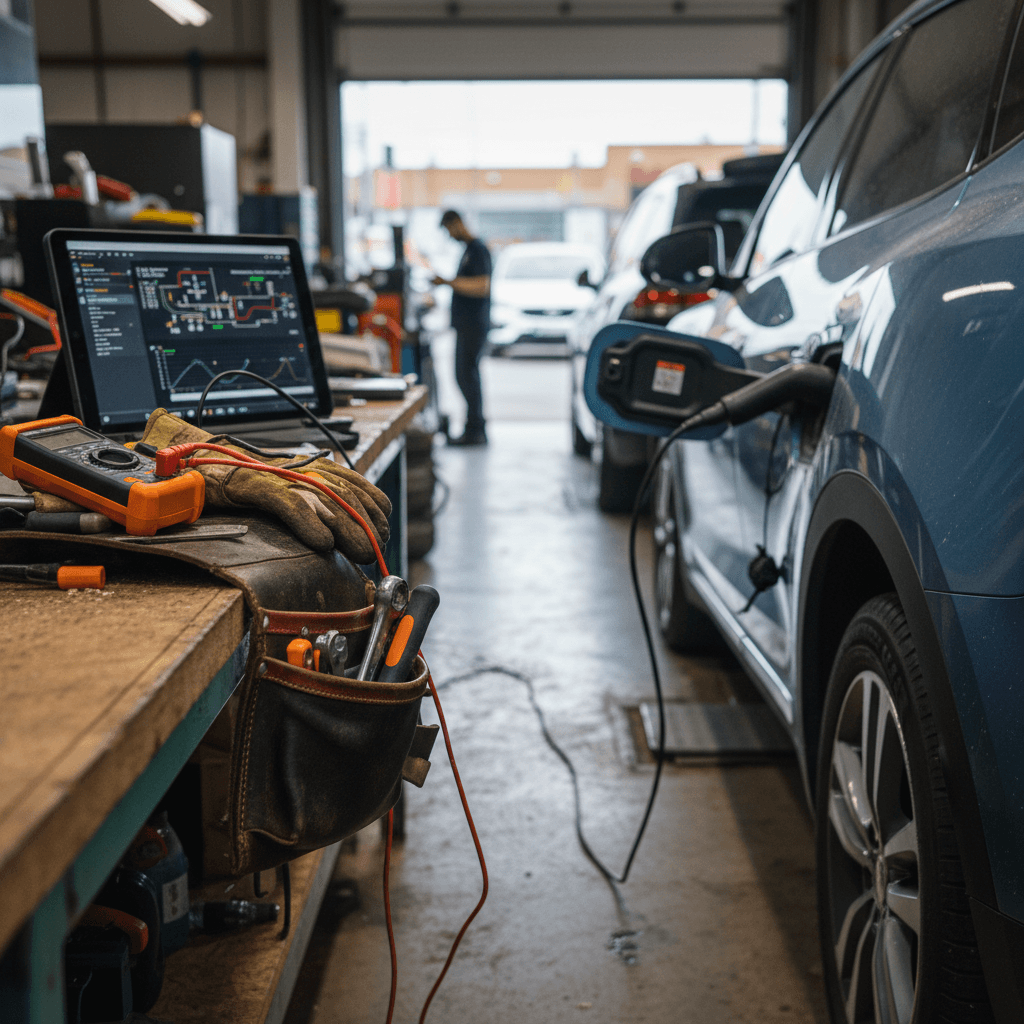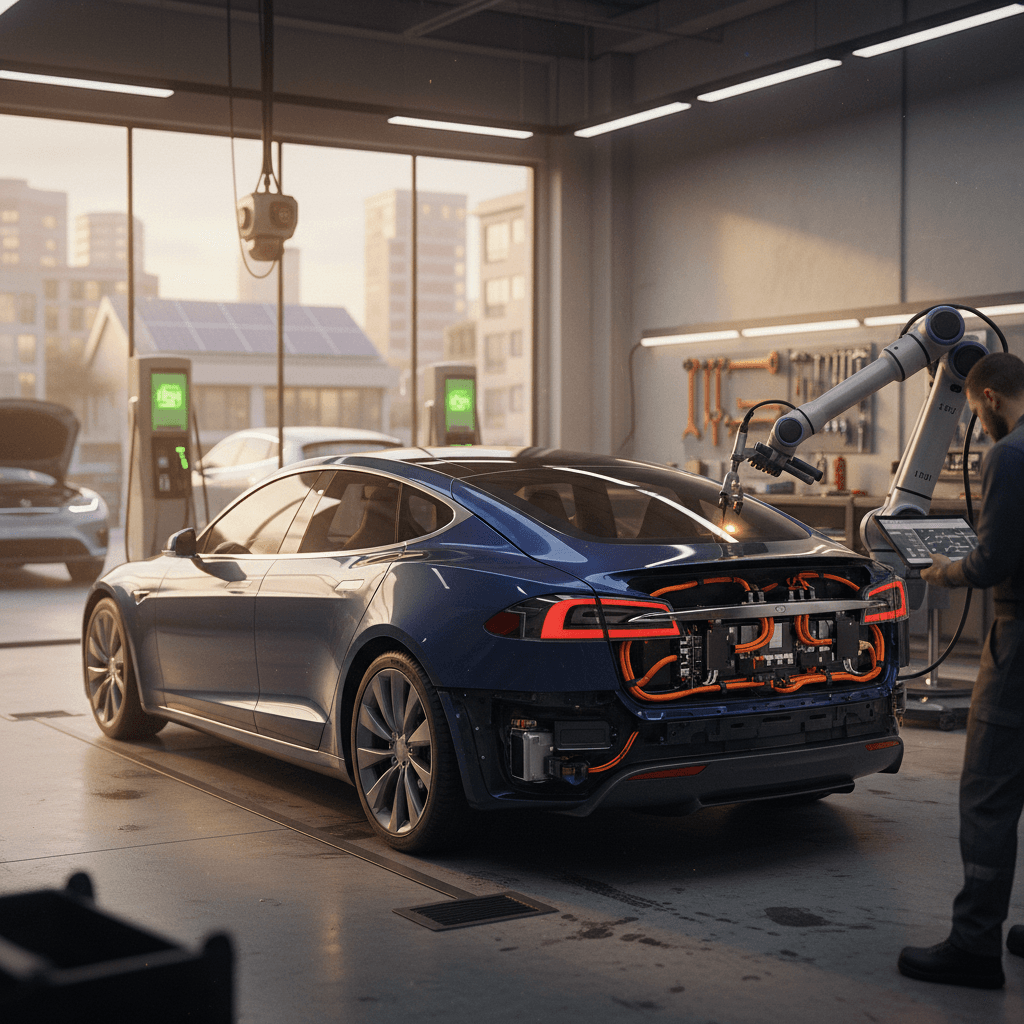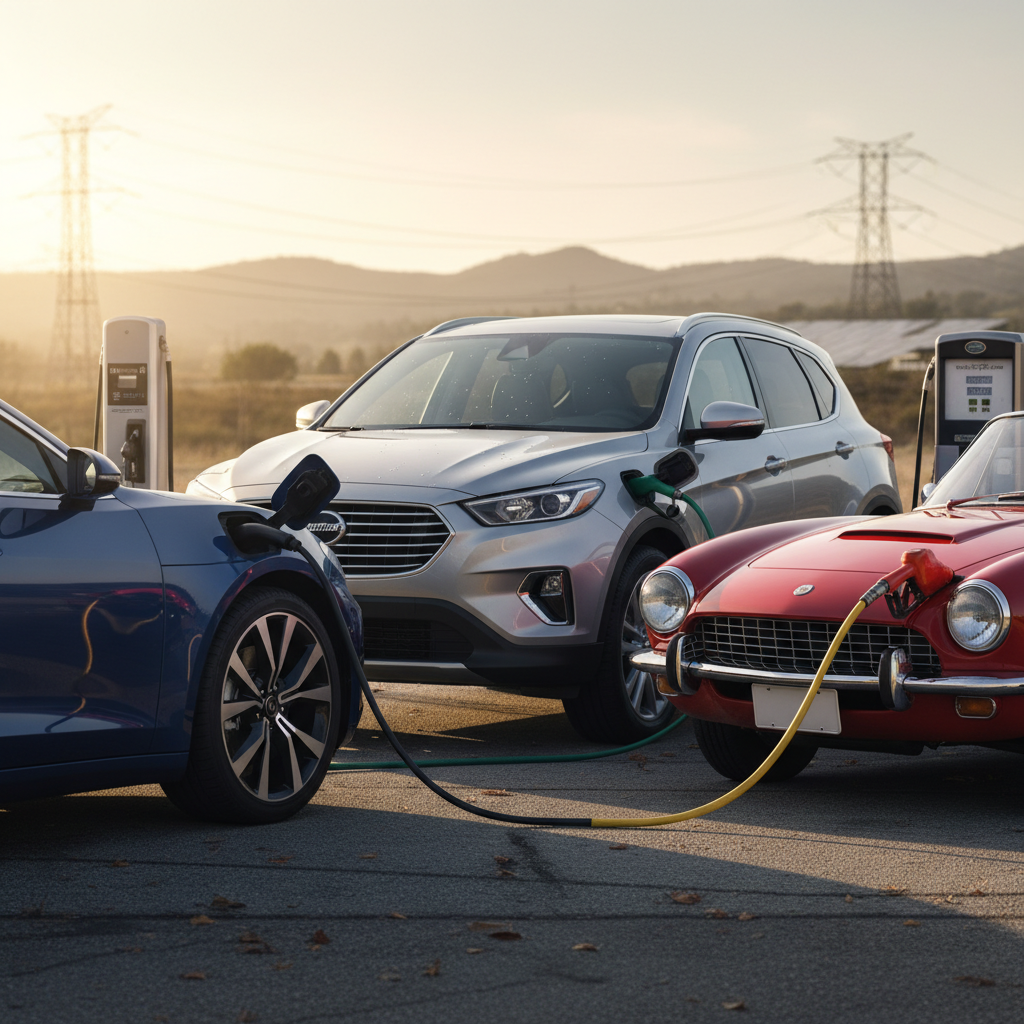If you’ve typed “repair shops near me” with an electric vehicle in the driveway, you’ve probably realized something: not every neighborhood garage is ready for 400–800 volts and a floor‑pan full of lithium‑ion cells. The good news is that you don’t need a high‑end EV boutique for every squeak or warning light, but you do need to know which shop can safely do what.
EV repair is not one-size-fits-all
Why “repair shops near me” is different when you drive an EV
With a gas car, searching for repair shops near me is mostly about price, reputation, and how fast they can get you back on the road. With an EV, there’s a safety layer on top of all that. A modern electric car carries a high‑voltage battery pack that can deliver hundreds of amps instantly. A careless mistake isn’t just expensive, it can be dangerous for both technicians and your car.
- EVs have far fewer moving parts, so routine maintenance is lighter, but specialized repairs demand training and equipment.
- High‑voltage components and battery packs require strict safety procedures and insulated tools.
- Each brand (Tesla, Hyundai, Nissan, Ford, etc.) has its own software ecosystem, diagnostic codes and repair procedures.
- Collision or under‑body damage can affect battery safety, not just cosmetics.
When a cheap fix can be very expensive
What work any good neighborhood shop can handle
Let’s start with the reassuring part: a surprising amount of EV service can be done by the same trusted shop that’s been looking after your family’s gas cars, provided they’re competent, organized, and willing to follow OEM procedures.
Common EV jobs for local repair shops
If a shop has a lift, alignment rack and modern scan tools, they can usually handle these.
Tires & wheels
- Tire replacement and rotation
- Seasonal tire swaps
- Wheel balancing & alignment
EVs are heavy and hard on tires; expect more frequent replacements than a comparable gas car.
Suspension & steering
- Shocks, struts, bushings
- Tie rods, control arms
- Wheel bearings
These parts are broadly similar to ICE vehicles, but torque delivery and weight can wear them faster.
Brakes & basic service
- Brake pads, rotors, fluid
- Cabin air filters
- Wiper blades & bulbs
Regenerative braking means pads often last longer, but they still need periodic inspection and service.
Ask this simple question
Repairs that still need EV specialists or dealers
Some jobs are where you stop thinking "repair shops near me" and start thinking "who is properly trained not to turn my battery pack into a space heater." Those are the moments you want a factory service center or a truly EV‑focused independent shop.
Go to the dealer or OEM‑authorized EV center when…
- You see high‑voltage or battery warnings on the dash.
- The car refuses to charge or DC fast charging suddenly stops working.
- Range drops dramatically in weeks, not years.
- There’s been collision or under‑body damage near the battery pack.
- Your car is still within its battery or powertrain warranty.
Find an EV‑specialist independent shop when…
- Your warranty is expired but you want brand‑level expertise.
- You’re exploring battery module repairs or pack refurbishment instead of full replacement.
- You own an older EV (early Leaf, i3, first‑gen Bolt) and want creative, value‑minded options.
- You want second opinions on a dealer quote before you approve a five‑figure repair.
Never let a general shop "experiment" on high voltage
How to actually search for EV‑ready repair shops near you
Typing “EV repair shops near me” into Google is just the first move. The real value comes from filtering the results so you don’t waste time calling places that can’t help, or worse, shouldn’t.
Step‑by‑step: turning a Google search into a great EV shop
1. Start with maps, but zoom in on EV language
In Google Maps or Apple Maps, search for terms like “EV repair,” “electric car service,” or your brand plus “service.” Look for listings that explicitly mention electric or hybrid vehicles on their website or profile.
2. Cross‑check with your automaker’s locator
Most EV brands have online service locators. Tesla, Hyundai, Ford, Nissan and others show authorized service centers and, in some cases, certified collision shops.
3. Use independent directories & certifications
AAA, ASE and some EV‑specific organizations list shops with EV training. A listing isn’t a guarantee, but it’s a helpful filter when you’re choosing between five shops on the same block.
4. Read reviews like a detective, not a fan
Ignore generic “great service!” reviews. Look for: mentions of EVs by name, how the shop handled problems, and whether they kept owners updated on complex jobs.
5. Call two or three shops and compare
Pay attention to how confidently they talk about your specific EV. Do they mention high‑voltage safety, OEM procedures, and software updates? Or do they pivot back to generalities?

Certifications and signs a shop really understands EVs
A glossy website and a wall of NASCAR posters aren’t enough. When you’re short‑listing EV repair shops near you, look for signs that the shop respects both electricity and the truth.
What to look for on the wall, and in conversation
These signals are stronger than any marketing tagline.
Relevant certifications
- ASE certifications, ideally with EV or hybrid specializations.
- Evidence of factory training from your EV’s brand.
- High‑voltage safety courses or EV‑specific schools.
Safety culture
- Insulated tools and clearly marked high‑voltage areas.
- Technicians using gloves and PPE around orange cables.
- Written procedures for disabling high‑voltage systems.
Honest boundaries
The best shops happily say, “We can do A, B, and C on your EV, but for battery pack work or complex software faults you should see the dealer.” That honesty is worth more than a neon “We do it all” sign.
Three questions to ask before you book
Typical EV repair and maintenance costs
One reason people buy EVs is the promise of lower maintenance. That promise is mostly real. There’s no oil to change, no timing belt, no spark plugs. But tires, suspension and out‑of‑warranty repairs can still add up, especially on heavier, high‑performance models.
How EV repair costs stack up in 2025 (big picture)
Real‑world examples: common EV repair & service costs
These are ballpark figures in the U.S. market as of late 2025. Quotes vary by region and shop, but this gives you a sense of scale.
| Repair / Service | Where you’ll usually go | Typical cost range |
|---|---|---|
| Tire replacement (set of 4, EV‑rated) | Local tire or repair shop | $800–$1,400 |
| Wheel alignment | Local repair shop | $120–$250 |
| Brake service (pads & rotors, axle) | Local repair shop | $350–$900 |
| HVAC heat pump diagnosis | EV‑experienced shop or dealer | $400–$1,500 |
| On‑board charger / DC fast‑charge fault | EV specialist or dealer | $800–$3,000 |
| Drive‑unit or inverter replacement | Dealer or high‑end EV shop | $3,000–$8,000+ |
| Module‑level battery repair | EV battery specialist | $3,000–$7,000 |
| Full battery pack replacement (out of warranty) | Dealer or specialist | $8,000–$20,000+ depending on vehicle |
Use these numbers to sanity‑check estimates from local repair shops or dealers.
Sticker shock checklist
Collision repair and structural work on EVs
Bodywork is another place where “repair shops near me” can be a trap for EV owners. Structurally, an electric car is often a rolling battery tray with a car built on top. Bend that structure in the wrong way and you’re not just fixing sheet metal, you’re talking about crash safety and pack integrity.

- For light cosmetic work (bumpers, small dents), a quality independent body shop is often fine.
- For hits near the battery pack, floor pan or front/rear crash structures, look for OEM‑certified collision centers.
- Many automakers publish lists of EV‑approved body shops, use those before trusting a random “we fix anything” sign.
- If an insurer pushes you toward a specific shop, verify that the shop has EV structural experience, not just volume.
Watch the repair vs total‑loss line
Battery repair, replacement, and when to actually worry
The biggest fear behind every "EV repair shop near me" search is the battery. You’ve seen the headlines, $15,000, $20,000, $30,000 battery swaps. Those numbers exist, but they’re not the whole story. In practice, only a small minority of EVs ever need a full pack replacement, and when they do, it’s often under warranty.
Battery problems: what’s normal, what isn’t
Knowing the difference saves you both panic and money.
Likely normal wear or minor issue
- Slow, steady range loss over 8–10 years.
- A few miles of range missing after a cold snap.
- Small differences between the dash estimate and real‑world range.
- Occasional DC fast‑charge throttling on hot days.
Most of this is just chemistry and software doing their thing.
Time for a specialist to look closer
- Range drops 15–30% in a few months.
- The car refuses to fast charge at stations that work for others.
- High‑voltage or “service battery” alerts that don’t clear.
- History of severe overheating, flooding or major impact.
These are the moments for a dealer or EV battery specialist, not a general repair shop.
“Only a small fraction of EV owners will ever pay out‑of‑pocket for a full battery pack. The fear is real, but the odds are very much in your favor, especially if you buy a car with verified battery health.”
Why Recharged cares so much about battery data
Before Google: warranty, roadside and mobile service
Before you even fire up your "repair shops near me" tab, make sure you’re not walking away from help you’ve already paid for. Modern EVs come with generous battery and powertrain warranties, and many brands bundle roadside assistance or mobile service support.
Quick triage before you start calling shops
Check your warranty status
Battery warranties often run 8–10 years or around 100,000 miles. Powertrain coverage can be similar. A surprising number of expensive repairs are quietly covered, if you ask the right people first.
Use roadside assistance
If the car is undriveable or shows serious HV warnings, use the roadside number in your owner’s manual or app. Let them tow it to an authorized facility instead of guessing.
Look for mobile or remote service
Some brands and independent EV specialists can diagnose issues remotely or send a technician to you for software‑level repairs, 12‑volt battery issues, and other minor problems.
Document everything
Take photos of warning lights, error messages, and any physical damage. This helps any future shop or insurer understand what really happened.
How Recharged helps, before you ever need a repair shop
The best way to survive the “repair shops near me” maze is to start with a car that’s been honestly evaluated. That’s where Recharged comes in. We’re a retailer and marketplace built around making used EV ownership simple and transparent, including the part where something eventually breaks.
What Recharged adds to the repair equation
Less mystery now, fewer ugly surprises later.
Recharged Score battery diagnostics
Every car on Recharged gets a Recharged Score Report with verified battery health and fair‑market pricing. You see how the pack is performing before you buy, not after a shop gives you bad news.
Financing & fair trade‑ins
If a big repair bill ever makes you rethink your car, Recharged offers financing, trade‑in and instant offer options so you can move into a different EV without starting from zero.
Nationwide delivery & EV specialists
Whether you buy online or visit our Experience Center in Richmond, VA, you get access to staff who live and breathe EVs, not just generic car talk. We’ll talk through real‑world repair expectations for the models you’re considering.
Buy the car, not the mystery
EV repair shops near me: FAQ
Frequently asked questions about EV repair shops
Key takeaways: choosing the right EV repair shop
When you search “repair shops near me” as an EV owner, you’re really asking two questions: who can fix the ordinary wear‑and‑tear items for a fair price, and who can keep their head when 800 volts and a battery pack are involved. The answer is rarely one shop that does everything. It’s a small, smart ecosystem: a local shop you trust for everyday work, a dealer or specialist for the high‑voltage stuff, and a car that started life in your driveway with its battery health fully understood.
Choose shops that are honest about their limits, ask pointed questions about EV experience, and sanity‑check big repair quotes against the ranges in this guide. And if you’re still choosing which EV to put in your garage, consider starting with a vehicle from Recharged so that the biggest variable, battery health, is already on the table before any wrench is turned.



